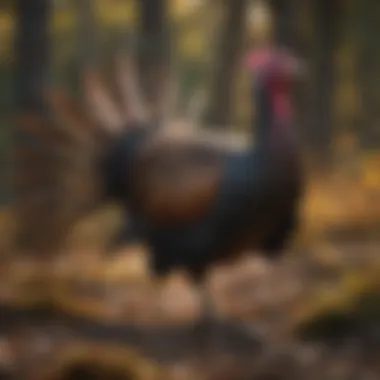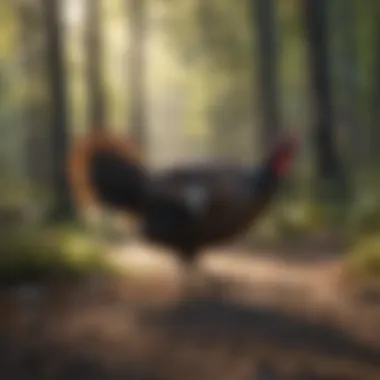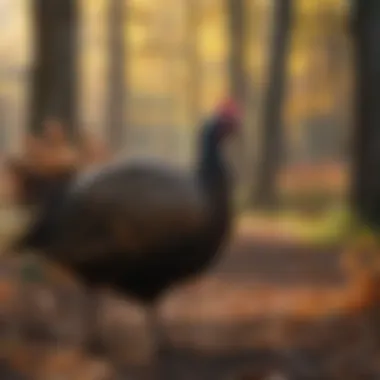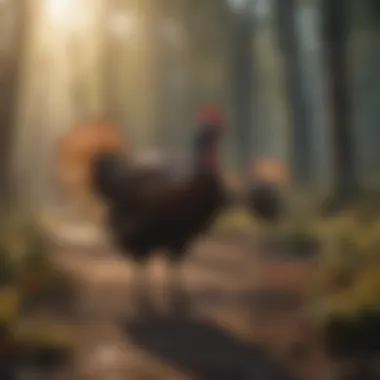Proven Strategies for Effectively Managing Wild Turkeys on Your Property


Overview of the Topic
Current Status and Challenges
Examining the current state of wild turkey populations reveals a complex scenario where these majestic birds face evolving challenges to their natural habitats and populations. Expanded urbanization, habitat destruction, and human-wildlife conflicts are key factors contributing to the precarious balance governing wild turkey territories.
Sustainable Solutions
Exploring sustainable practices plays a pivotal role in counteracting the challenges posed to wild turkey populations. By adopting methods such as habitat conservation, wildlife corridors, and education on cohabitation practices, individuals can actively engage in fostering a sustainable environment for wild turkeys and their cohabitants.
Showcasing successful case studies exemplifies the efficacy of strategic planning and conservation efforts in managing wild turkey populations. These examples serve as practical demonstrations of how integrated approaches can mitigate threats and enhance the quality of interactions between humans and wild turkeys.
Impact and Importance
Analyzing the impact of wild turkeys on ecosystems and communities underscores their significant role in the ecological framework. Conservation endeavors and sustainable resource management not only benefit present populations but also uphold intergenerational equity, emphasizing the importance of maintaining a delicate balance between human activities and wildlife preservation.
Understanding Wild Turkeys
Wild turkeys are a crucial aspect of wildlife management on properties, requiring a deep understanding to effectively manage their populations. Knowledge of their behavioral patterns is essential in developing strategies for coexistence. By comprehending their roosting habits, feeding preferences, and communication signals, property owners can implement targeted management approaches. Understanding these aspects provides insight into fostering a balance between the turkeys and the property's ecosystem, ensuring a harmonious cohabitation.
Behavioral Patterns
Roosting Habits
Roosting habits play a significant role in the daily lives of wild turkeys, influencing their safety and behavior. Roosting is essential for protection from predators and adverse weather conditions, emphasizing the importance of suitable roosting locations. Turkey roosting generally occurs in trees, preferably with dense foliage for concealment. While roosting in trees protects them from ground predators, it may expose them to aerial threats. Property owners can leverage this behavior by enhancing tree cover to promote roosting in preferred areas, reducing stress for the turkeys and minimizing potential conflicts.


Feeding Preferences
Understanding wild turkeys' feeding preferences is vital for property management practices. Turkeys are omnivorous, consuming a variety of foods, including seeds, fruits, insects, and vegetation. By identifying their preferred food sources, property owners can manipulate habitats to attract or deter turkeys effectively. Knowledge of these preferences aids in developing bird-friendly landscapes that support the turkeys' dietary needs while reducing damage to essential vegetation. Implementing appropriate feeding areas ensures a sustainable food supply for turkeys, fostering their presence on the property.
Communication Signals
Communication signals are integral to wild turkeys' social interactions and hierarchy establishment. Turkeys use various vocalizations and gestures to convey warnings, mating calls, and dominance. Recognizing these signals enables property owners to interpret turkey behavior accurately, identifying potential conflicts or mating seasons. By grasping the intricacies of turkey communication, management strategies can be tailored to promote positive interactions and minimize disruptions to the turkeys' natural behaviors.
Ecological Impact
Wild turkeys' foraging behavior and habitat destruction significantly influence property ecosystems, necessitating careful management strategies. By understanding the ecological impact of turkeys, property owners can proactively address potential challenges and maximize benefits through sustainable practices.
Foraging Behavior
Turkeys play a key role in ecosystem dynamics through their foraging behavior, primarily impacting plant distributions and soil composition. Their selective feeding habits influence vegetation growth, seed dispersal, and nutrient cycling within the ecosystem. By analyzing their foraging behavior, property owners can predict and mitigate any adverse effects on vegetation and soil health. Implementing forage management measures can help control the ecological impact of turkeys, balancing their presence with the overall ecosystem's health.
Habitat Destruction
Wild turkeys' habitat destruction tendencies can pose challenges for property owners seeking to maintain a diverse and robust ecosystem. Turkeys may impact vegetation cover, seed dispersal, and nesting sites through their foraging and roosting activities. Understanding the extent of habitat destruction caused by turkeys is crucial for implementing targeted conservation efforts. By adopting sustainable habitat management practices, such as habitat restoration and protection, property owners can mitigate potential damage and maintain a healthy environment for both turkeys and other wildlife species.
Implementing Preventive Measures
Implementing preventive measures is crucial for effectively managing wild turkey populations on your property. By focusing on natural deterrents and structural modifications, you can ensure a harmonious coexistence with these majestic birds. These measures not only protect your property but also promote responsible wildlife management practices.
Natural Deterrents
Landscaping Modifications


Landscaping modifications play a vital role in deterring wild turkeys from causing damage to your property. By strategically planting shrubs and flowers that are unappealing to turkeys, you can create a natural barrier that discourages their presence. The key characteristic of landscaping modifications lies in their ability to alter the habitat in a way that makes it less attractive to wild turkeys. This choice is popular among property owners looking for eco-friendly and non-invasive ways to manage turkey populations. While landscaping modifications are effective in mitigating turkey activity, it's important to consider the ongoing maintenance required to sustain their deterrent effects.
Plant Selection
Careful consideration of plant selection is essential for successful turkey management. Opting for plant species that are unpalatable to turkeys can significantly reduce their presence on your property. The primary advantage of plant selection as a deterrent method is its natural approach, aligning with sustainable wildlife management practices. Unique features such as strong scents or bitter tastes in selected plants act as natural repellents, deterring turkeys from foraging in specific areas. However, a potential disadvantage of plant selection lies in the time and effort needed to research and cultivate the right plant species best suited for deterring wild turkeys.
Structural Modifications
Fencing Options
Fencing serves as a practical solution to prevent wild turkeys from accessing sensitive areas on your property. The key characteristic of fencing options is their ability to create physical barriers that restrict turkey movement, protecting vulnerable landscape features. This choice is beneficial for property owners seeking immediate and long-term protection against turkey-related damage. The unique feature of fencing lies in its adaptability to various property sizes and layouts, offering customization based on specific needs. While fencing effectively secures designated areas, considerations such as installation costs and maintenance requirements should be taken into account.
Roosting Prevention Methods
Implementing roosting prevention methods is essential for managing turkey populations. By removing or modifying roosting sites, you can proactively discourage turkeys from settling in unwanted areas. The key characteristic of roosting prevention methods is their direct impact on turkey behavior, disrupting established patterns and roosting habits. This choice is popular for its humane approach to deterring turkeys without causing harm. However, a potential disadvantage lies in the need for consistent monitoring and adjustment to prevent turkeys from finding alternative roosting locations.
Harvesting Practices and Regulations
When it comes to managing wild turkey populations on your property, understanding and adhering to harvesting practices and regulations play a pivotal role. Harvesting practices refer to the methods employed in controlling turkey numbers, ensuring a sustainable and balanced ecosystem. Regulations, on the other hand, encompass laws and guidelines set by wildlife authorities to safeguard the population of wild turkeys while allowing for ethical hunting practices.
Legal Considerations
Hunting Laws
Hunting laws constitute a fundamental component of the broader discussion on wildlife management. These laws outline the stipulations and restrictions related to hunting wild turkeys. Understanding hunting laws is crucial as they dictate the permissible methods, seasons, and locations for hunting these birds. Compliance with hunting laws not only fosters conservation efforts but also contributes to maintaining a healthy turkey population. While hunting laws vary across regions, they all aim to ensure the sustainable utilization of wild turkey resources.
Permit Requirements


Permit requirements serve as a critical aspect of legal considerations in wild turkey management. Before engaging in turkey hunting activities, individuals are typically required to obtain permits from relevant wildlife agencies. These permits serve as official authorization and help monitor and regulate hunting activities. By setting specific guidelines and limits, permit requirements aid in the conservation of wild turkey populations. However, it is essential to adhere to permit conditions to prevent overexploitation and promote sustainable management practices.
Ethical Hunting Practices
Taking Limits
Setting taking limits is a key practice in ethical turkey hunting. Taking limits signify the maximum number of turkeys that can be harvested per hunter during a specific time period. These limits prevent excessive hunting, ensuring that turkey populations remain healthy and stable. Adhering to taking limits is essential for maintaining ecological balance and sustainable turkey management. By respecting these limits, hunters contribute to the overall well-being of turkey populations and the ecosystem.
Respectful Harvesting
Respectful harvesting emphasizes ethical and humane hunting practices. It involves treating wild turkeys with respect and dignity throughout the hunting process. This approach not only considers the welfare of the turkeys but also acknowledges their inherent value within the ecosystem. By prioritizing respectful harvesting techniques, hunters uphold ethical standards and demonstrate a responsible approach to wildlife conservation. Respecting the natural environment and the animals therein is paramount for fostering harmonious relationships between humans and wild turkey populations.
Seeking Professional Assistance
In the realm of managing wild turkeys on your property, seeking professional assistance emerges as a pivotal aspect. Entrusting the expertise of wildlife management services can significantly enhance the efficacy and sustainability of your conservation efforts. These services offer specialized knowledge and tailored solutions to address the unique challenges posed by wild turkey populations. By collaborating with experienced professionals, property owners can navigate regulatory frameworks, implement ethical practices, and optimize the conservation outcomes. Partnering with wildlife management services also fosters a holistic approach towards wildlife conservation, ensuring the well-being of both the environment and the wildlife population.
Wildlife Management Services
Consultation Services
Consultation services play a crucial role in the domain of wildlife management, providing in-depth insights and strategic recommendations for effective wild turkey population control. These services offer personalized guidance tailored to the specific needs and objectives of the property owner. Through thorough site evaluation and data analysis, consultation services help devise comprehensive plans that align with conservation goals and regulatory requirements. By leveraging their expertise in wildlife behavior and ecological dynamics, consultants empower property owners to make informed decisions and implement sustainable management practices. The key characteristic of consultation services lies in their ability to deliver customized solutions that optimize conservation outcomes and promote harmonious coexistence with wild turkeys.
Population Control Plans
Population control plans constitute a fundamental component of wildlife management services, focusing on regulating wild turkey populations to mitigate ecological impact and promote ecosystem balance. These plans encompass a range of strategies, including population assessments, monitoring protocols, and population control measures tailored to the specific habitat and conservation goals. By delineating population control objectives and methodologies, property owners can effectively manage wild turkey populations while maintaining ecological integrity. The key characteristic of population control plans lies in their capacity to integrate scientific data and ethical considerations to achieve sustainable conservation outcomes. While population control plans offer an effective means of managing wild turkey populations, property owners must navigate the potential challenges and ethical considerations inherent in these strategies.
Community Involvement
Engaging the community in wildlife conservation efforts is integral to fostering collective responsibility and promoting environmental stewardship. Local conservation groups play a pivotal role in mobilizing community support, raising awareness about conservation issues, and advocating for sustainable management practices. By collaborating with local conservation groups, property owners can access a wealth of knowledge, resources, and partnerships that augment their conservation initiatives. The key characteristic of local conservation groups lies in their grassroots approach to conservation, empowering local communities to actively participate in wildlife management and habitat protection. While local conservation groups offer numerous benefits, property owners should be mindful of potential limitations and conflicts that may arise in community-based conservation efforts.
Educational Workshops
Educational workshops serve as valuable platforms for disseminating knowledge, building capacity, and fostering a culture of learning and collaboration in wildlife management. These workshops cover a range of topics, including wildlife behavior, habitat conservation, and ethical management practices, providing participants with essential tools and strategies for effective wild turkey population management. By engaging with educational workshops, property owners can enhance their understanding of wildlife conservation principles, acquire practical skills, and network with like-minded individuals in the field. The unique feature of educational workshops lies in their interactive and hands-on approach to learning, allowing participants to gain practical experience and insights into the complexities of wildlife management. While educational workshops offer a valuable learning experience, property owners should consider the time commitment and resources required to participate in these programs.



